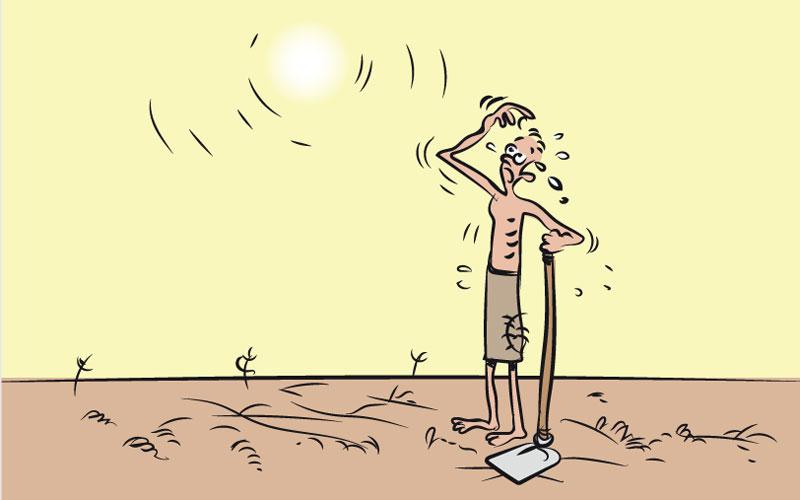Reply To:
Name - Reply Comment

The plight of the farmers in the Udawalawe area who have been severely affected by the prevailing drought was the most prominent news item carried in the Sinhala language newspapers yesterday. The water capacity in the Udawalawe Reservoir which is said to be 217,000 acre-feet has reduced up to about 2,000 acre-feet (less than one per cent of the full capacity), according to reports that quoted the engineer in charge of the reservoir as stating.
The reports further say that around 25,000 hectares of farmlands and more than 30,000 families who directly depend on them have been affected by the drought. It is common knowledge that not only those 30,000 families but hundreds of thousands of families, would have to face a food shortage if the current cultivation of paddy and other crops in that area were destroyed by the drought.
Despite the media attention having currently been focused only on the Udawalawe area drought has taken its toll across the country. Apart from threatening the staple food cultivation, even the lives of wild animals in 15 national parks including those in Wilpattu, Yala, Wasgamuwa and Kaudulla have been threatened, as over 50 per cent of waterholes in them have already dried, according to Sri Lanka Wildlife Rangers Association. Reports also say that many areas in the country including Jaffna have faced a severe drinking water shortage and water supply authorities are advising the public not to use pipe-borne water for watering home gardens and vehicle washing.
The farmers of the Udawalawe area have been demanding 1,500 cubic feet of water per day from power generating Samanalawewa Reservoir which has also affected by the drought but not as much as Udawalawe Reservoir, in order to save their crops from being destroyed. A tense situation broke out on Sunday between the police and the farmers who travelled in buses to Samanalawewa reservoir and attempted to barge into the protected area. A group of farmers have threatened to surround the headquarters of the Ceylon Electricity Board (CEB) in Colombo, demanding water from Samanalawewa Reservoir to Udawalawe Reservoir.
Meanwhile, security has been beefed up around Power and Energy Minister Kanchana Wijesekera’s residence as the CEB which refuses to release water from Samanalawewa Reservoir to Udawalawe Reservoir comes under him. And it has been reported that the Cabinet has also decided against releasing water from Samanalawewa Reservoir as it would jeopardize power generation. However, Agriculture Minister Mahinda Amaraweera and Sports Minister Roshan Ranasinghe, an MP representing mainly farmers and also the Minister of Irrigation have been supporting the Udawalawe farmers’ demands. It is said that explanation has been called from Minister Ranasinghe for publicly expressing views against the Cabinet decision.
In fact, this issue is closely connected to the current programme involving the International Monetary Fund (IMF) to bail out the crisis-hit Sri Lanka, as electricity pricing is directly related to it. The IMF even prior to it reaching its Staff Level agreement with Sri Lanka in September last year has been stressing the need to maintain “cost-reflective pricing” for electricity and water. The authorities of the power sector who have been demanding another electricity tariff hike for the past weeks are contending that releasing water from Samanalawewa would force them to implement power cuts again. And it would also compel them to increase the thermal power generation as well, which inevitably increase their costs. That would in turn push them towards further increasing the tariff to meet the cost-effective pricing condition of the IMF at a time when the Public Utilities Commission of Sri Lanka (PUCSL) has rejected their requests for tariff hikes. This is a catch-22 situation for the authorities.
On the other hand, if the authorities did not release water to Udawalawe Reservoir there is a danger of various crops including paddy in more than 25,000 hectares being destroyed which would in turn compel the authorities to import rice and other agricultural produces, at a time when the country is facing a huge foreign exchange crisis. The departmental mindset of the ministers seems to be hindering a collective solution to the problem. Although the root cause of the problem is the failure on the part of the past governments to solve the problems of drought and floods which alternately affect the country, through a comprehensive strategy, the government of the day must have an immediate solution, in a manner that would mete out justice for both the farmers and the electricity consumers.